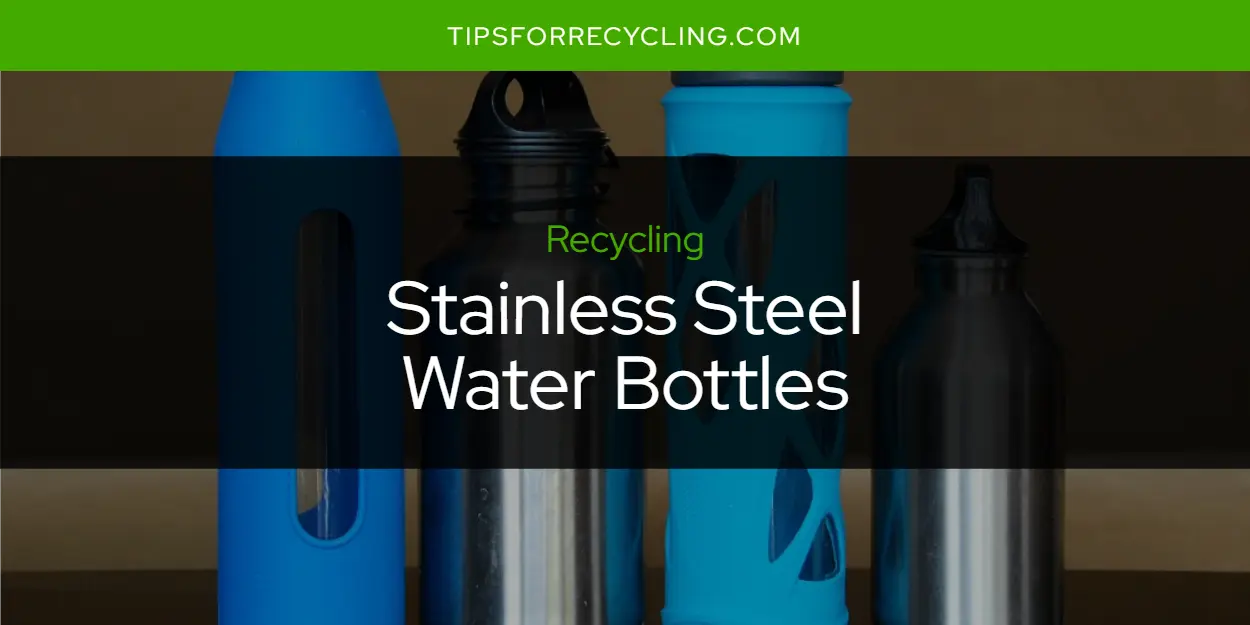Can You Recycle Stainless Steel Water Bottles?

Yes, you can recycle stainless steel water bottles as long as they are not made of a mix of other materials like plastic or rubber. Stainless steel is a durable and recyclable material that can be recycled multiple times without losing its quality or becoming contaminated. In fact, it takes roughly 60-80 percent less energy to recycle a stainless steel water bottle than it does to create a new one.
See the below map for locations where you can recycle stainless steel water bottles.
No, you cannot typically make money from recycling stainless steel water bottles. However, there are some companies that offer incentives for people who recycle their bottles in bulk. For example, some companies may pay you to collect and bring them used water bottles in exchange for store credit or discounts on products.
Similarly, see if you can recycle stainless steel.
Recycling stainless steel water bottles has many benefits for both the environment and those who use them. Not only does it help reduce waste by keeping reusable materials out of landfills, but it also reduces the amount of resources needed to create new items. Additionally, recycling helps conserve natural resources such as oil, gas, coal and metal ores which would otherwise be mined or drilled out of the earth. Lastly, recycling helps reduce greenhouse gas emissions associated with manufacturing processes such as smelting and metalworking.
Similarly, see if you can recycle metal water bottles.
Most cities have collection centers where you can take your used water bottles for recycling. You should check with your local waste management company to see what types of items they accept for recycling so that you know what needs to be taken where. It’s important to make sure your bottle is completely empty before taking it to the center - any remaining liquid inside could contaminate other materials in the bin, making them unusable for further processing. Additionally, always remember to remove any caps or lids before placing the bottle into the collection container as these are usually not accepted for recycling either due to safety reasons or because they’re made from a different type of material (such as plastics).
Similarly, see if you can recycle smart water bottles.
You can take your used stainless steel water bottle(s) directly to most local city waste management centers that offer recycling services - simply ask your local center if they accept this type of item and they should provide you with specific instructions on how best to proceed with dropping off your used bottles safely and responsibly. Some larger cities may even have drop-off boxes specifically designated for collecting these kinds of items as well so keep an eye out!
Similarly, see if you can recycle plastic water bottles.
Before taking your used water bottle in for recycling, it’s important to clean it thoroughly first; this will help ensure that any residual liquid doesn’t contaminate other items in the bin that could potentially ruin entire batches of usable products during further processing steps down the line. To clean your bottle properly: 1) rinse thoroughly 2) fill with warm water & dish soap 3) let soak 4) scrub gently 5) rinse again 6) dry completely 7) repeat process twice more 8) discard after third cleaning cycle is complete 9) place empty bottle into designated collection container (if available).
Similarly, see if you can recycle dasani water bottles.
If you don’t properly dispose of a stainless steel water bottle by taking it directly to a recycling center or throwing it away in an appropriate receptacle (such as trash cans marked “recycling only”), then this could result in serious environmental damage if left unchecked over time due to contamination from liquids still present within the container when discarded incorrectly - this can cause pollution from harmful chemicals leaching into nearby ecosystems and waterways which is why proper disposal at all times is essential!